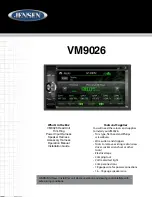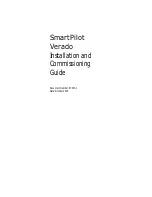
Page 109
T
5CL8
10.3.4 8-Bit Pulse Width Modulation (PWM) Output Mode (TC3, 4)
This mode is used to generate a pulse-width modulated (PWM) signals with up to 8 bits of resolution. The
up-counter counts up using the internal clock.
When a match between the up-counter and the PWREGj value is detected, the logic level output from the
timer F/Fj is switched to the opposite state. The counter continues counting. The logic level output from the
timer F/Fj is switched to the opposite state again by the up-counter overflow, and the counter is cleared. The
INTTCj interrupt request is generated at this time.
Since the initial value can be set to the timer F/Fj by TCjCR<TFFj>, positive and negative pulses can be gen-
erated. Upon reset, the timer F/Fj is cleared to 0.
(The logic level output from the
PWMj
pin is the opposite to the timer F/Fj logic level.)
Since PWREGj in the PWM mode is serially connected to the shift register, the value set to PWREGj can be
changed while the timer is running. The value set to PWREGj during a run of the timer is shifted by the
INTTCj interrupt request and loaded into PWREGj. While the timer is stopped, the value is shifted immedi-
ately after the programming of PWREGj. If executing the read instruction to PWREGj during PWM output,
the value in the shift register is read, but not the value set in PWREGj. Therefore, after writing to PWREGj, the
reading data of PWREGj is previous value until INTTCj is generated.
For the pin used for PWM output, the output latch of the I/O port must be set to 1.
Note 1: In the PWM mode, program the timer register PWREGj immediately after the INTTCj interrupt request is
generated (normally in the INTTCj interrupt service routine.) If the programming of PWREGj and the inter-
rupt request occur at the same time, an unstable value is shifted, that may result in generation of the pulse
different from the programmed value until the next INTTCj interrupt request is generated.
Note 2: When the timer is stopped during PWM output, the
PWMj
pin holds the output status when the timer is
stopped. To change the output status, program TCjCR<TFFj> after the timer is stopped. Do not change the
TCjCR<TFFj> upon stopping of the timer.
Example: Fixing the
PWMj
pin to the high level when the TimerCounter is stopped
CLR (TCjCR).3: Stops the timer.
CLR (TCjCR).7: Sets the
PWMj
pin to the high level.
Note 3: To enter the STOP mode during PWM output, stop the timer and then enter the STOP mode. If the STOP
mode is entered without stopping the timer when fc, fc/2 or fs is selected as the source clock, a pulse is out-
put from the
PWMj
pin during the warm-up period time after exiting the STOP mode.
Note 4: j = 3, 4
Table 10-5 PWM Output Mode
Source Clock
Resolution
Repeated Cycle
NORMAL1/2, IDLE1/2 mode
SLOW1/2,
SLEEP1/2
mode
fc = 16 MHz
fs = 32.768 kHz
fc = 16 MHz
fs = 32.768 kHz
DV7CK = 0
DV7CK = 1
fc/2
11
[Hz]
fs/2
3
[Hz]
fs/2
3
[Hz]
128
µ
s
244.14
µ
s
32.8 ms
62.5 ms
fc/2
7
fc/2
7
–
8
µ
s
–
2.05 ms
–
fc/2
5
fc/2
5
–
2
µ
s
–
512
µ
s
–
fc/2
3
fc/2
3
–
500 ns
–
128
µ
s
–
fs
fs
fs
30.5
µ
s
30.5
µ
s
7.81 ms
7.81 ms
fc/2
fc/2
–
125 ns
–
32
µ
s
–
fc
fc
–
62.5 ns
–
16
µ
s
–
Summary of Contents for CEM2100/00
Page 2: ...2 ...
Page 3: ...BLOCK DIAGRAM ...
Page 4: ...WIRING DIAGRAM 4 ...
Page 5: ...CIRCUIT DIAGRAM MAIN BOARD 5 ...
Page 6: ...6 ...
Page 7: ......
Page 11: ...PCB LAYOUT MAIN BOARD TOP SIDE VIEW 11 ...
Page 12: ...PCB LAYOUT MAIN BOARD BOTTOM SIDE VIEW 12 ...
Page 13: ...PCB LAYOUT PANEL BOARD TOP SIDE VIEW ...
Page 14: ...14 PCB LAYOUT PANEL BOARD BOTTOM SIDE VIEW ...
Page 15: ...PCB LAYOUT REMOTE BOARD TOP SIDE VIEW 15 ...
Page 16: ...PCB LAYOUT REMOTE BOARD BOTTOM SIDE VIEW 16 ...
Page 17: ...PCB LAYOUT TUNER BOARD TOP SIDE VIEW 17 ...
Page 18: ...PCB LAYOUT TUNER BOARD BOTTOM SIDE VIEW 18 ...
Page 19: ...PCB LAYOUT SD BOARD TOP SIDE VIEW ...
Page 20: ...20 PCB LAYOUT CD CONNECTOR TOP SIDE VIEW ...
Page 21: ...PCB LAYOUT ISO BOARD BOTTOM SIDE VIEW 21 ...
Page 22: ...22 SET EXPLODER VIEW DRAWING ...
Page 23: ...1 of 2 CEM2100 Trouble shooting Trouble shooting Trouble shooting Trouble shooting ...
Page 33: ...7 0 6SHFLILFDWLRQ 6 VWHP EORFN GLDJUDP ...
Page 110: ...7 0 6SHFLILFDWLRQ 5HYLVLRQ KLVWRU 2 2 s u 2 u 2 7 t 2 2 2 S S 5 2 v 2 2 ...
Page 111: ...8 Bit Microcontroller TLCS 870 C Series T5CL8 ...
Page 113: ...Revision History Date Revision 2008 7 31 1 First Release ...
Page 114: ......
Page 122: ...viii ...
Page 126: ...Page 4 1 3 Block Diagram T5CL8 1 3 Block Diagram Figure 1 2 Block Diagram ...
Page 130: ...Page 8 1 4 Pin Names and Functions T5CL8 ...
Page 155: ...Page 33 T5CL8 ...
Page 156: ...Page 34 2 Operational Description 2 3 Reset Circuit T5CL8 ...
Page 186: ...Page 64 5 I O Ports 5 8 Port P7 P77 to P70 T5CL8 ...
Page 194: ...Page 72 6 Watchdog Timer WDT 6 3 Address Trap T5CL8 ...
Page 214: ...Page 92 8 16 Bit TimerCounter 1 TC1 8 3 Function T5CL8 ...
Page 270: ...Page 148 12 Asynchronous Serial interface UART1 12 9 Status Flag T5CL8 ...
Page 280: ...Page 158 13 Asynchronous Serial interface UART2 13 9 Status Flag T5CL8 ...
Page 332: ...Page 210 16 Serial Bus Interface I2C Bus Ver D SBI 16 6 Data Transfer of I2C Bus T5CL8 ...
Page 342: ...Page 220 17 10 bit AD Converter ADC 17 6 Precautions about AD Converter T5CL8 ...
Page 354: ...Page 232 19 Flash Memory 19 4 Access to the Flash Memory Area T5CL8 ...
Page 388: ...Page 266 21 Input Output Circuit 21 2 Input Output Ports T5CL8 ...
Page 397: ...Page 275 T5CL8 23 Package Dimensions LQFP64 P 1010 0 50D Rev 01 Unit mm ...
Page 398: ...Page 276 23 Package Dimensions T5CL8 ...
Page 400: ......
Page 428: ...TC94B14MFG 2010 01 12 28 Package LQFP80 P 1212 0 50F Weight 0 6 g Typical ...
















































